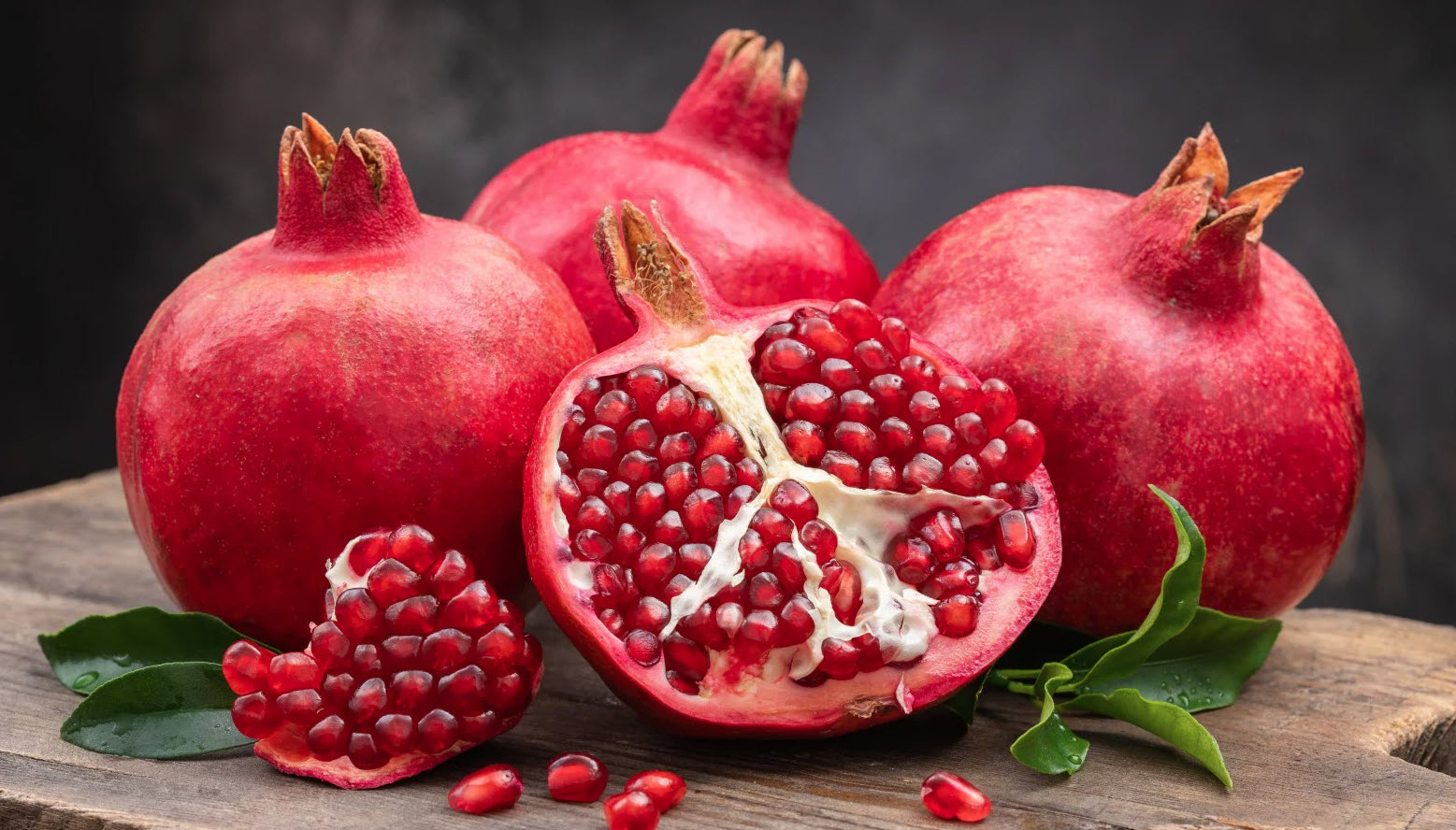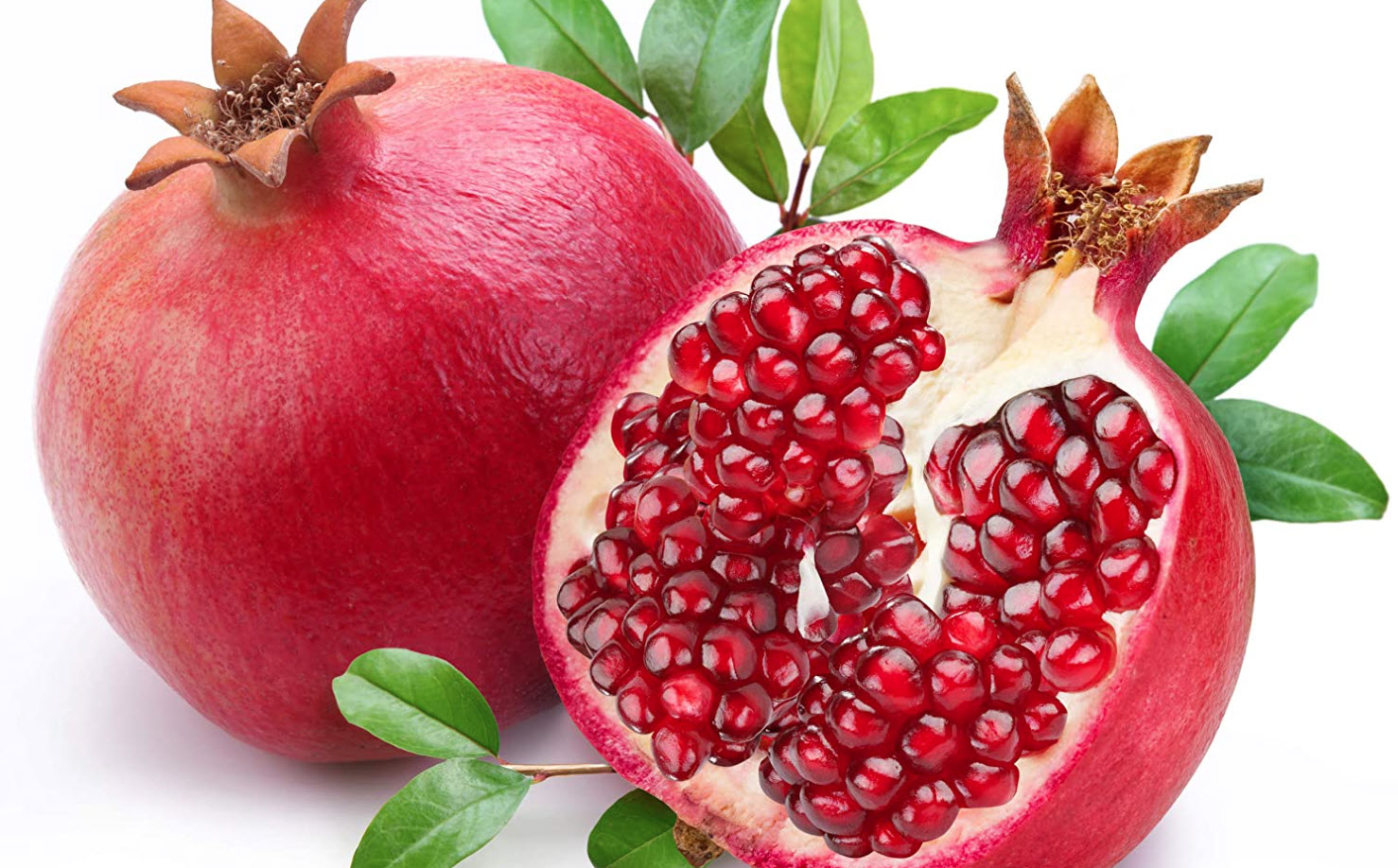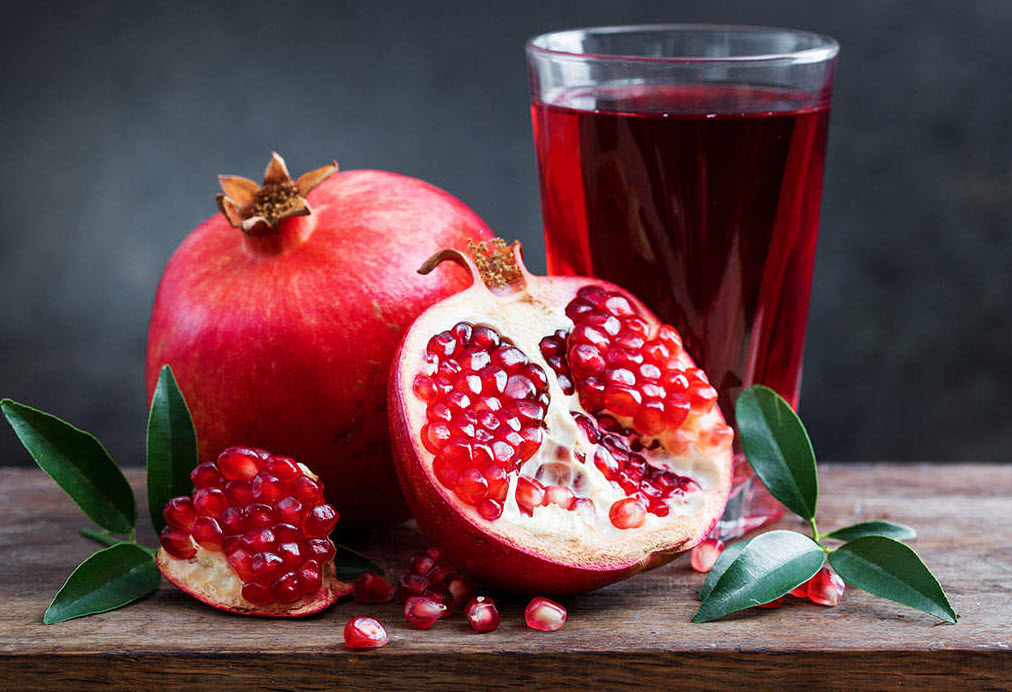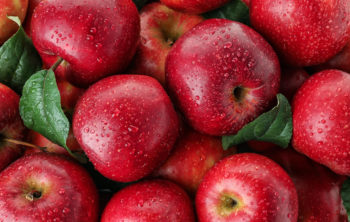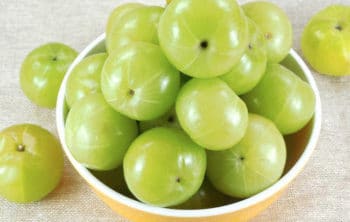Contents
Pomegranate: Health Benefits in Diabetes, Hypertension, Pregnancy
Pomegranate is one of the healthiest fruit. It has a high nutritional value as it is a rich source of multivitamins, minerals, antioxidants. It also works as an antibiotic and anti-viral. The new research shows that it has anti-cancerous properties too.
Its botanical name is Punica Granatum belongs to Lythraceae family. The pomegranate tree is a deciduous shrub or small tree generally growing up to 6-10 meter.
What is Pomegranate?
Pomegranate (Punica granatum) is a fruit-bearing deciduous shrub or small tree growing between five and eight meters high. The pomegranate plant belongs to the genus Punica in the family Lythraceae, which also includes flame trees, loosestrife, pomegranate’s close relatives. Its flowers have bright red petals that open into five pointed star shapes.
Pomegranate is native to the region from eastern Europe to western Asia, north of the Himalaya where it was known in ancient times (in Iran, etc.) and widely cultivated. Today pomegranates are commonly cultivated throughout Turkey, India, Afghanistan, Pakistan, China, the Himalayas and South America. Pomegranates grow well in a hot climate up to about 50° latitude, but thrive between 30° N and 30° S. They can be grown in cooler climates if protected from winter cold and frost by a wall or fence. Pomegranate trees have been cultivated for 3,000 years or more in south-west Asia, northern Africa and southern Europe.
The pomegranate (Punica granatum) is a fruit-bearing deciduous shrub or small tree growing between five and ten meters tall. The pomegranate is of great historical, religious, and cultural importance in many parts of the globe. Its many varieties have been cultivated since ancient times throughout regions around the Mediterranean Basin and Northern India, where pomegranates grow well in hot climates such as Iraq and Iran.
The pomegranate was brought to England from its native Persia by Mary Queen of Scots when she returned home from France in 1561 after her marriage to Dauphin Francis II, who died soon afterward. Illustrations accompanying this engraving show that pomegranates were grown in the greenhouses of pomological enthusiasts soon after this time.
The pomegranate was introduced to California by Spanish settlers in 1769, who planted it along the El Camino Real (the Royal Road) from Mexico City to San Diego. It was probably introduced into Florida by the same means and subsequently spread northward by birds and animals that eat its fruit and then excrete or regurgitate seeds near water sources. The pomegranate is now cultivated throughout many warm-winter areas of the world where crop production and marketing conditions allow for economic feasibility.
Many pomegranate cultivars are grown; some are purple, others red, pink, yellow or orange; most common pomegranates usually grow one to three meters tall, but pomegranate trees are also known to grow up to ten meters at times.
Nutrition of Pomegranate:
Nutrition in Pomegranate has been described below:
- 100 gm of pomegranate contains about 80 gm of calories.
- An average size of fruit contains around 50 gm of carbohydrate, 3 gm of fat and 5 gm of protein. It has almost zero amounts of cholesterol.
- The fruit has high fibers as 100 gm of it provides around 12 gm of fiber which is 1/3rd of the daily requirement of a person.
- It is a high source of vitamins. It has vitamin B complex, vitamin K, vitamin C and Folic Acid. 100 gm of fruit provides about 80% of daily requirement of vitamin C.
- It also contains good amount of minerals, Calcium, Copper, Magnesium, Phosphorous, Zinc, Sulphur etc.
- Pomegranate has a very small amount of iron. There is a myth regarding iron. People generally think that it is a great source of iron because of its red color.
- It also has some amount of electrolyte.
- The bark, stem, skin, and juice of the fruit contains high amount of Tannin which is known to accelerate blood clotting, reduce blood pressure, decrease the serum lipid level, produce liver necrosis, and modulate.
- Pomegranate bark powder contains Pelleterine and Isopelleterine active contents, which work as antibiotic and anti-helminths.
Read more: Top 11 Amazing Health Benefits Of Eating Grapes
Health benefits of pomegranate:
What is pomegranate good for? Pomegranates are a fruit that is often overlooked, but they are actually packed full of antioxidants and health benefits. In this post, we will explore some of the ways that pomegranates can benefit your health. We will also discuss how to incorporate pomegranates into your diet. So, if you are looking for a nutritious and delicious fruit, be sure to give pomegranate a try!
1. For Digestive Problems:
It is very much effective to treat anorexia, hyperacidity, diarrhea, and dysentery. Acidic value of it stimulates the liver to produce and secrete bile juice thus it is also used to treat hepatitis. The decoction of Bark and fruit skin is used to treat worm infection of the intestine, especially tapeworms.
2. Pomegranate and Diabetes:
Oriental medicine practitioners are using it to treat diabetes for ages. Newly research by modern medicine practitioner also supports it. Pomegranate juice has active contains Gallic, Punicagallic, Oleonic acid, Urosolic acid and others, which stimulates pancreas beta cells to produce the increased amount of insulin. Sugar in it takes longer time to digest thus it does not increase the level of blood sugar. It is effective for diabetes type 2 that is insulin resistance diabetes. It is a question of doubt that does it also treats diabetes type 1.
3. For Hypertension:
High amount of natural antioxidant and effective contents like Catechine and Tannin reduce plaques in blood vessels and Atherosclerosis (hardening of blood vessels). Researchers have found pomegranate reduces LDL cholesterol and produces no effect on HDL cholesterol. It also improves cardiac muscle tone, hence reduces chances of Cardiac Stroke (Cardiac Attack).
4. Pomegranate for Cancer:
On the basis of the clinical trial on animal, extract of pomegranate reduces the size of prostate, colon, lung, skin and breast tumors. Its effectiveness in human cancer is still under trial. Anti-oxidant property of it reduces side effects of chemotherapy. For a cancer patient, it is advisable to consume 100ml of pomegranate juice regularly.
5. Pomegranate for Skin:
Pomegranate leaves are used to treat eczema and urticarial. Direct application of the paste of young leaves or decoction of leaves purify blood and improves blood circulation. In oriental medicine, pomegranate is effectively used to treat all sorts of skin problems. Application of bark and leaves paste on face works as a facial scrub.
6. Pomegranate in Pregnancy:
Multivitamins and multimineral property of it make it extremely beneficial for pregnancy. It also reduces the symptoms of the first trimester of pregnancy like morning sickness, nausea and constipation.
Pomegranate for Dogs:
Dogs are human’s best friends. it is very important to know which human fruits and vegetables are good for them because some of the human diet item shows the poisonous property to them. Pomegranate has low amount of fat but high amount of fiber and our canine friends do not need high fiber diet. So sharing a small amount of it, is good.
For Cats:
It does not show any life-threatening condition in cats but as fruits are not a natural diet for cats, avoiding or sharing only small amount without sugar and preservative is advisable.
In Oriental Medicine:
Oriental medicine practitioners are using it for thousands of year. Ancient Ayurvedic Classics like Charak Samhita, Sushrut Samhita, Ashtang Hraday describe several benefits of it. It shows anti-inflammatory properties, improves the general weakness. It is good for male sexual problem, diacritic, improves muscle tone and cardiac activity.
Uses of Pomegranate:
- Fruit: Fruit juice with seeds or without seed.
- Fruit skin: Dry powder of fruit skin
- Leaves: Extract of leaves, decoction of leaves, cold decoction of leaves, Paste of young leaves
- Bark: Only decoction
- Root: Only decoction
Side effects of Pomegranate:
- Some people have allergy from it, but it is very rare and very mild. However, very rarely, pomegranate extract can cause the anaphylactic reaction.
- Excessive consumption of it can upset your stomach because of high fiber diet and some specific enzyme reaction.
- Use only prescribed amount of it for diabetes and weight loss due to its high sugar content
- It lowers blood pressure if you consume high amount of it along with antihypertensive medicine it can cause a sudden decrease in blood pressure.
- Its leaves, root, and bark contain the high amount of Tannin. Some people are allergic to Tannin. So please consult oriental medicine practitioner before using any of it containing decoction or medicine.
What is Pomegranate Juice Good For?
Within pomegranates are small red seeds which are known as pomegranate arils. Pomegranate juice is made by squashing pomegranate fruit, and can be drunk on its own or used in various recipes. As pomegranates contain high levels of antioxidants they have many health benefits, some of which include:
- Increased energy: pomegranates help break down food into useable energy for the body
- Immunity booster: pomegrantes improve the function of white blood cells to reduce inflammation and therefore boost immunity Prevention of heart disease – pomengranates protect against free radicals that damage tissue, pomegranate has also been shown to increase ‘good’ cholesterol (HDL) and reduce ‘bad’ cholesterol (LDL).
Some potential pomegranate juice side effects include:
- Heartburn: pomegranates may help protect against heart disease, but they can cause heartburn if you already suffer from it.
- Intestinal discomfort: pomegranate arils contain fiber which is great for your digestive system, but too much will result in intestinal discomfort. Like other high fibre foods such as bran and dried fruit, pomagranate should be eaten in moderation to prevent diarrhea and bloating.
- Diarrhea: pomegranate contains a lot of soluble fiber. Fiber absorbs water and speeds up the passage food through your intestine – that’s good if you have stomach cramps, but it can cause diarrhea if pomegranate is eaten in excess.
- Potassium toxicity: pomegranates are high in potassium, which is a mineral that’s essential for many aspects of human health. However, pomengranates aren’t regulated to the same extent as pharmaceutical drugs, so don’t take pomegranate juice supplements or prescription medicines within five hours of each other – this could lead to too much potassium in your blood stream, which may cause serious problems like paralysis and heart irregularities.
You could also try using pomegranate seed oil on your skin; it has similar benefits to pomegranate juice plus potent antioxidants which help increase skin elasticity and combat free radicals. It’s also great for puffy eyes, applying pomegranate seed oil to the under-eye area will de-puff and reduce dark circles by encouraging skin regeneration. You can purchase pomegranate seed oil from most health food stores or online retailers such as Amazon.
Conclusion:
Pomegranate is a fruit with many health benefits. A study has found that it may be beneficial in the treatment of diabetes, hypertension and pregnancy-related complications. It can also lower cholesterol levels, which helps to reduce risk factors for cardiovascular disease. If you’re interested in some additional research on the potential benefits of pomegranates – there are plenty of resources available online or read our blog post!
Read more: Pineapple: Health Benefits, Side Effects, Nutrition And Usage
Disclaimer:
Above article is only for knowledge purpose. Please contact your healthcare provider before using any of above medicine or method. For any query or personal consultation according to your health condition please contact your doctor.

